A desperate parent fighting for custody. A spouse stuck in a toxic marriage. A family facing the challenges of a complex divorce. These individuals urgently need legal advice—and they’re searching for it online.
They’ll either find your firm or your competitors.
Firms that prioritize SEO for family lawyers are the ones that rise to the top of search results, earn the trust of potential clients, and ultimately secure their business.
If your firm isn’t showing up prominently online, you’re missing out on clients. This step-by-step guide will walk you through how SEO for family lawyers can elevate your rankings and help you attract more qualified leads.

The Critical Role of SEO for Family Lawyers
When someone searches for “divorce lawyer near me” or “child custody attorney in [your city],” your firm needs to be at the top of the search engine results page (SERP). Why? Because people rarely scroll past the first few listings. The top three organic search results get over 54% of all clicks, and about 75% never scroll past the first page of search results.
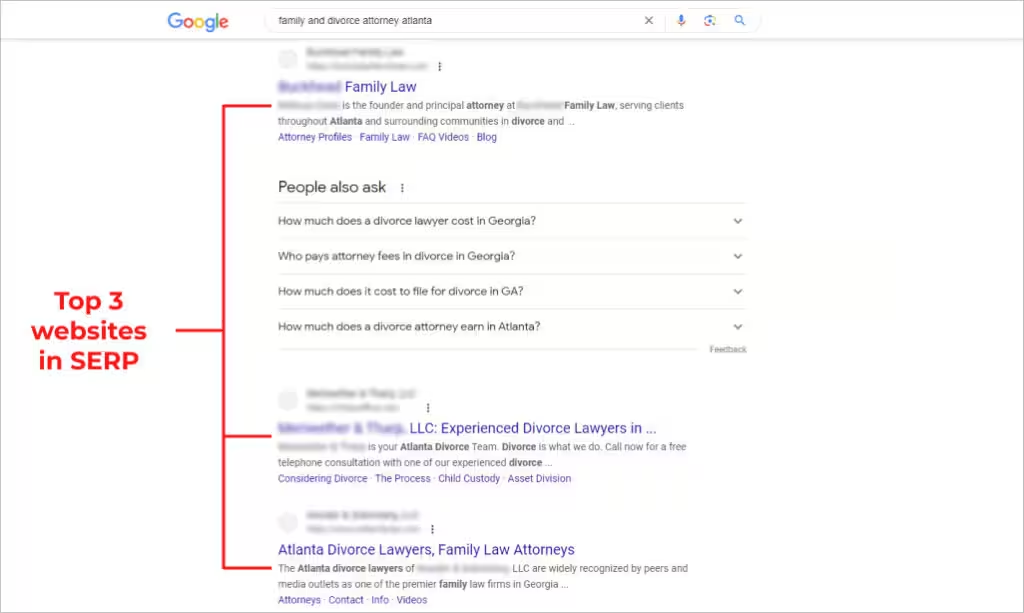
Comrade’s Key Takeaway
Family law firms that prioritize SEO consistently outperform competitors in attracting clients online. Whether you choose the DIY approach or hire an expert, the key is taking action.
At its core, SEO is about optimizing your website and content so it ranks higher on Google and other search engines.
But SEO isn’t just about pleasing search engines—it’s about understanding your clients’ needs. Think about it: People searching for alimony, custody, or divorce lawyers are often in stressful, urgent situations.
They don’t just want a legal expert—they want clear, trustworthy answers that make them feel confident in reaching out. That’s why a successful SEO plan goes beyond rankings. It ensures your website is:
- Structured
- Easy to navigate
- Filled with valuable content that addresses common legal questions
Remember, Google’s algorithms prioritize helpful, relevant information. When your website delivers what clients need, it ranks higher—and ultimately drives more inquiries and consultations for your firm.
Comrade Digital Marketing Agency can help you with the above if you’re unsure how to go about it. Schedule a free consultation.
Understand Your Family Law Firm’s Unique Edge
Before you invest in SEO for family law, ask yourself: What makes your law firm stand out?
Not all family law firms are the same. Some focus on fathers’ rights, others on high-net-worth divorces. If your firm blends into the crowd, potential clients won’t see a compelling reason to choose you.
Comrade’s Key Takeaway
A strong USP (unique selling proposition) sets your firm apart and makes it more memorable. SEO for family law can drive traffic to your website—but if your messaging sounds like every other firm, you’ll still struggle to convert visitors into clients.
Here are some examples of strong USPs to help inspire your own:
- “We specialize in helping fathers fight for their parental rights.”
- “Our firm has a proven track record in high-net-worth divorce cases.”
- “Our team is entirely made up of women fighting for women.”
Start By Understanding Your Ideal Clients
To create a compelling USP, you first need to understand who you’re targeting.
Key Questions to Define Your Audience:
- Are your primary clients men, women, or a mix of both?
- What are their biggest concerns when they contact your firm?
- What legal questions do they ask most often?
When you address these pain points in your website content, you’re not just improving your message—you’re also enhancing your SEO for family law by aligning with the search terms your ideal clients are using.
7-Step Plan to Grow Your Family Law Firm with SEO for Divorce Lawyers
Let’s break down the key law firm SEO tactics that will help you outrank competitors, attract more local clients, and build a thriving family law practice.
1. Conduct Keyword Research
The right keyword approach ensures your family law firm appears in front of the right audience at the right time. Here’s how it’s done:
1. Research Local Keywords – To attract clients in your area, you need to understand what they’re searching for. People looking for family law services often use phrases like “divorce law firm in [city]” or “family attorney near me”.
But remember, not all searches are the same. Keywords typically fall into two categories:
Informational Keywords (When people are researching legal issues)
- “How long does a divorce take?”
- “What are father’s rights in [city]?”
- “How is child custody determined?”
Transactional Keywords (When someone is ready to hire a lawyer)
- “Divorce lawyer near me”
- “Best family attorney in [city]”
- “Child custody attorney in [city]”
Why does knowing the difference matter? If your firm isn’t ranking for the right mix of informational and transactional keywords, you’re missing out on potential clients at every stage of their decision-making process. The goal is to show up when they’re researching and when they’re ready to hire.
2. Analyze Competitor Keywords – Conduct a content gap analysis to uncover what your competitors rank for—and, more importantly, what they’re missing. This allows you to create content that fills those gaps and draws in more clients.
3. Use Powerful SEO Tools – Platforms like Google Keyword Planner, SEMrush, and Ahrefs can help you identify high-ranking keywords, analyze search volume, and assess competition.
4. Optimize for Clicks & Conversions – Once you have the right keywords, integrate them naturally into your website, blog posts, and landing pages to boost rankings and drive more potential clients to your firm.
Keyword research isn’t just about ranking higher—it’s about getting found by the right people and turning searches into real consultations.
2. Leverage Local SEO for Divorce Attorneys
When someone searches for a family law attorney near them, Google’s Map Pack is one of the first things they see.
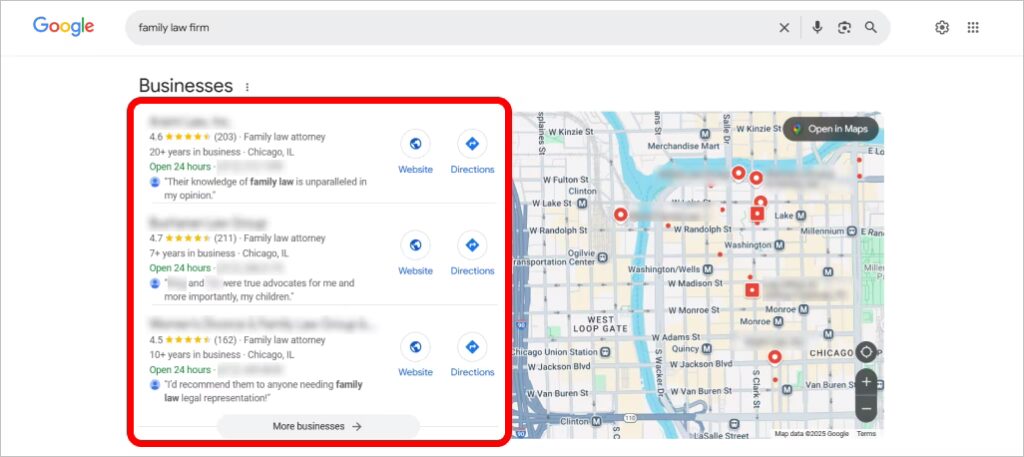
If your firm isn’t ranking there, you’re losing clients to competitors who are. Local SEO puts your law firm in front of high-intent searchers, increasing your inquiries and consultations. So how do you secure this prime real estate?
How Can You Rank Your Family Law Practice in Local Search?
To rank higher in local searches and increase client inquiries, you need to optimize your GBP profile using these key approaches:
1. Maintain a Consistent NAP (Name, Address, Phone Number)
Ensure your contact information is uniform across directories like Avvo, FindLaw, Justia, and SuperLawyers. Consistency builds trust with Google and improves local search rankings.
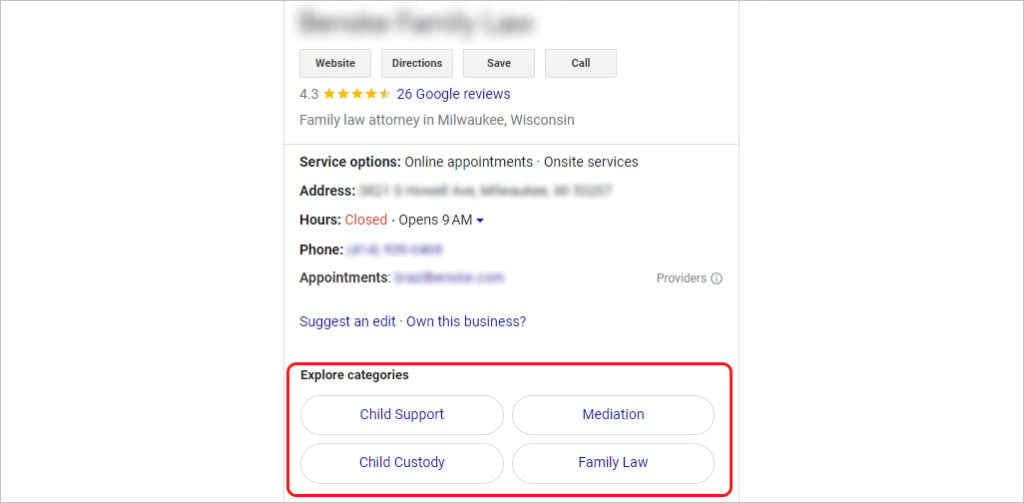
2. Leverage the Q&A Feature
Use the GBP Q&A section to answer common legal concerns about divorce, custody, and family law matters. This builds trust, improves engagement, and increases your chances of appearing in voice searches.
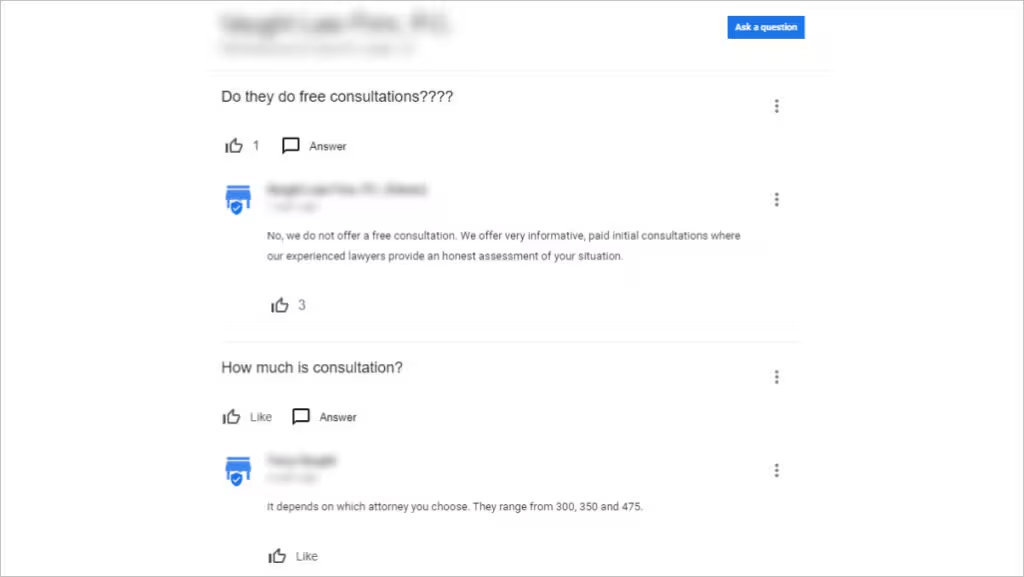
3. Encourage and Respond to Client Reviews
Google prioritizes businesses with frequent, high-rated reviews. Ask satisfied clients to leave reviews and respond to all feedback professionally—this strengthens credibility and signals trust to both potential clients and Google.
4. Use Local Keywords and Create Location-Specific Content
Incorporate city-specific keywords into your website, meta descriptions, and GBP profile (e.g., “Chicago divorce lawyer”). Write blog posts and landing pages that mention local landmarks, courts, and family law regulations to establish local relevance.

5. Keep Your Profile Active with Regular Posts
Post legal insights, case outcomes, and updates on family law regulations. Consistently updating your GBP profile with fresh content improves visibility and keeps your firm top-of-mind.

6. Expand Review Management Beyond Google
Encourage clients to leave reviews not only on Google but also on Avvo, Yelp, BBB, and other legal directories. Having positive reviews across multiple platforms boosts trust and improves your rankings.
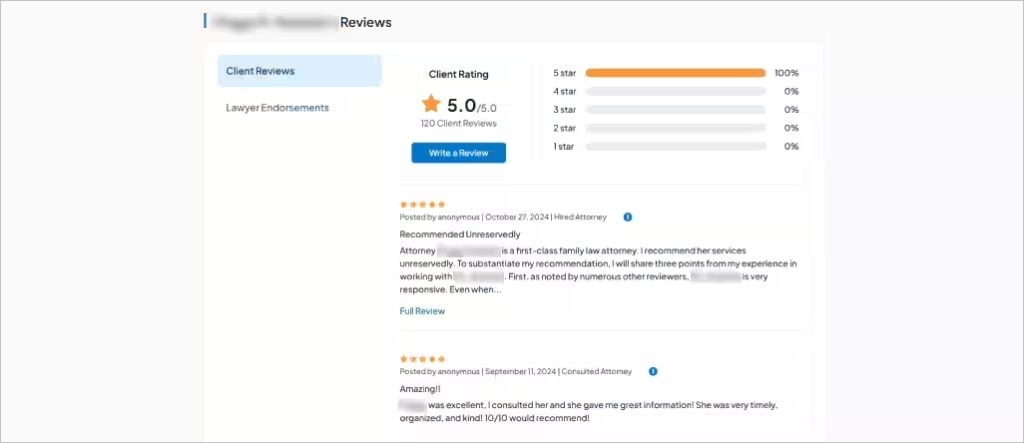
Comrade’s Key Takeaway
Our exclusive client data shows, on average, 31% of all legal leads come from Google Business Profile, with some firms generating up to 71% from this channel.
3. EEAT (Experience, Expertise, Authority, and Trustworthiness):
Google ranks content from trustworthy, authoritative sources higher. EEAT (Experience, Expertise, Authoritativeness, and Trustworthiness) is a crucial part of SEO for divorce law firms because it helps signal credibility to both Google and potential clients.
- Optimize your About page by including credentials, awards, certifications, and years of experience. This reinforces your authority in the legal field.
- Showcase media mentions, guest articles, and podcast appearances to demonstrate industry recognition. If you’ve been featured in a legal journal, news article, or on a reputable website, highlight it.
Also, list memberships in legal organizations like the American Bar Association (ABA) or local/state bar associations to further establish your firm’s credibility and trustworthiness
Comrade’s Key Takeaway
Our client data reflects that traditional organic search accounts for 42% of law firm leads, making it the second-largest source of legal clients.
Why Both Local & Organic SEO Matter For Family Law Website?
To maximize your online presence, your firm should rank in both Google’s Map Pack and organic search results. By combining local SEO and organic SEO, you can significantly increase your visibility and lead flow.
Stay ahead of the competition with cutting-edge law firm SEO services – read our expert insights today!
4. Rank You Law Firm With Relevant Content
Your website isn’t just a digital business card—it’s a powerful tool to educate and connect with potential clients. One of the most effective ways to build awareness and establish authority is through strategic blogging, a key component of SEO for family lawyers.
By consistently publishing high-quality, informative content, you can reach individuals early in their research—before they even begin comparing law firms. To maximize your impact:
- Use Top-of-the-Funnel Keywords – Focus on broader, less competitive search terms that answer common family law questions. These keywords are essential for attracting potential clients in the early stages of their journey and support strong on-page optimization for family law attorneys.
- Address Real Client Concerns – Think about the most pressing issues your clients face—divorce, child custody, alimony—and create content that provides clarity, guidance, and reassurance.
- Make It Engaging and Easy to Read – Avoid legal jargon. Your blog posts should be well-structured, approachable, and written in a way that makes complex legal topics easy to understand.
A strong blog not only improves your site’s visibility through SEO for family lawyers, but also positions you as the trusted expert people turn to when they’re ready to take legal action.el informed and trust your insights, they’re much more likely to choose you when it’s time to hire a lawyer.
Unlock the power of blogging for lawyers in 2025. Get started with our comprehensive tips and insights.
5. Focus on Link Building for Your Family Law Firm Website
Think of links as votes of confidence for your website, but remember, not just any link will do. Focus on getting reputable sites to link to your law firm’s website. Why is this so important?
Comrade’s Key Takeaway
Quality backlinks increase domain authority, making it easier to rank higher in search results.
One key factor in this process is Domain Authority (DA), a ranking metric developed by Moz. The higher your DA, the more likely your website is to outrank competitors and attract potential clients. The best way to improve your DA? Follow the lead of the best family law websites by securing high-quality backlinks that drive traffic and authority. Here’s how:
Effective Backlink Strategies for Family Law Firms
- Guest Blogging on Legal & Local Sites – Contribute valuable content to legal publications, professional blogs, and local news sites. This builds credibility while linking back to your firm’s key pages.
- Leverage Your Professional Network – Connect with mediators, financial advisors, and counselors who serve the same audience. These partnerships often lead to natural backlinks through shared resources and referrals.
- Partner with Local Businesses & Organizations – Join chamber of commerce groups, sponsor community events, or collaborate with nonprofits. These activities often result in strong, local backlinks that boost regional search rankings.
- Optimize Legal Directories & Review Platforms – Ensure your law firm is listed on high-authority legal directories like Avvo, FindLaw, and Justia, as well as general business directories relevant to your local market.
- Create Shareable Legal Resources – Develop in-depth guides on divorce, child custody, or court procedures that other organizations will want to link to as a resource.
- Use Internal Links to Strengthen SEO – Link related pages within your own website to help search engines and users navigate your content more effectively.
By building a strong network of high-quality backlinks, your law firm can elevate its rankings, increase credibility, and drive more qualified leads to your website.
Want to boost your law practice’s online authority? Dive into our comprehensive article on link building for lawyers.
6. Run a Technical Audit to Boost Indexing and Rankings
A slow, glitchy website doesn’t just frustrate visitors—it damages your search rankings and can cost your firm valuable leads. For SEO-optimized websites for family law practices, technical performance is just as important as great content.
We recommend performing a thorough technical audit to ensure your site runs smoothly, loads quickly, and is structured in a way that both users and search engines can easily navigate. Here’s what to focus on:
- Fix Broken Links – Dead-end 404 errors create a poor user experience and signal to search engines that your site isn’t well-maintained. Identifying and repairing broken links keeps visitors engaged and supports stronger rankings—key to effective SEO for divorce attorneys.
- Address Orphaned Pages – Pages with no internal links are invisible to both users and search engines. To improve site structure and visibility, either remove these pages or connect them to relevant content.
- Improve Page Speed – A slow website drives visitors away and weakens your SEO performance. Use tools like Google PageSpeed Insights to identify issues, then optimize image sizes, enable browser caching, and compress files for faster loading.
Ultimately, SEO-optimized websites for family law practices don’t just perform better in search—they also create a seamless, professional user experience that builds trust and encourages potential clients to reach out for help.
Want more clients for your firm? Our PPC for family lawyer tips deliver real results!
7. Track and Measure SEO Success to Maximize Growth
SEO is an ongoing strategy. To know what’s working and what needs improvement, you must track your results and adjust your approach accordingly.
By monitoring key performance indicators (KPIs), you can see exactly how your law firm’s local SEO efforts are driving leads and turning website visitors into clients.
Essential SEO Metrics to Track:
Tracking the right SEO metrics is essential to measuring your law firm’s success. Here are 3 key performance indicators (KPIs) to keep an eye on:
1. Return on Investment (ROI) for SEO
A strong SEO strategy should generate a positive return. Use this formula to determine if your SEO investment is paying off:
(SEO Leads × Conversion Rate × Average Case Value) – SEO Costs = SEO ROI
This metric helps you evaluate whether SEO is a profitable channel for acquiring new clients.
2. Cost Per Lead (CPL)
Compare your SEO cost per lead against other marketing channels to determine which strategies deliver the best value. If SEO generates leads at a lower cost than paid ads or traditional marketing, it’s a sign of a well-optimized strategy.
3. Conversion Rate
Your conversion rate measures the percentage of website visitors who take action, such as:
- Filling out a contact form
- Calling your law firm
- Booking a consultation
A high conversion rate indicates that your website is attracting the right audience and providing a user experience that encourages action.
To track and refine your SEO efforts, use industry-leading tools such as Google Analytics, SEMrush, and Ahrefs. These platforms provide valuable data on traffic, keyword rankings, user behavior, and overall website performance—helping you continuously optimize your strategy and drive more qualified leads to your firm.
Avoid These Common Family Law SEO Mistakes
Even the best SEO strategy can fall flat if you make critical mistakes that hold your rankings back. Here are some of the biggest SEO pitfalls that family law firms must avoid:
- Neglecting Mobile Optimization – More than half of all web traffic comes from mobile devices, so if your site isn’t fast, responsive, and easy to navigate, potential clients will leave—and Google will push your rankings down.
- Keyword Stuffing – Overloading your content with keywords sounds unnatural and can get your site penalized. Instead, focus on writing valuable, client-friendly content where keywords fit in organically.
- Ignoring Local SEO – If you’re not optimizing for local searches, you’re missing out on clients in your area. Make sure to claim and optimize your Google Business Profile and list your firm in legal directories like Avvo, FindLaw, and Justia.
- Not Tracking SEO Performance – If you’re not measuring your SEO success, you’re guessing instead of improving. Use Google Analytics and SEMrush to track traffic, keyword rankings, and conversions so you can adjust and refine your strategy over time.
By avoiding these mistakes, your law firm will rank higher, attract more qualified leads, and stay ahead of the competition in your local market.
Local SEO services for law firms is the key to connecting with potential clients who are actively searching for legal services in your area.
Want to attract more clients to your family law firm? Check out our comprehensive guide on family law digital marketing and start boosting your practice today!
Want Legal Leads Faster? Get an Effective Law Firm SEO Strategy with Comrade
As you’ve seen, SEO is essential to increase your site’s visibility and attract more clients. But it’s not a set-it-and-forget-it strategy. Ranking higher takes consistent effort, strategic optimization, and ongoing adjustments to stay ahead of the competition.
For busy family law attorneys like yourself, juggling SEO with your daily legal work can be overwhelming. That’s why partnering with law firm SEO experts is a smart investment in sustainable growth and a steady stream of high-quality clients.
This is where the Comrade Digital Marketing Agency can help. As a full-service digital marketing agency, we offer specialized SEO services for family lawyers. Our team of experts can help you identify and address technical issues, develop a comprehensive SEO strategy, and implement effective tactics to attract more potential clients to your business and increase your billable hours.
We also offer other solutions, including website design and development and PPC advertising. Investing in specialized SEO services from Comrade can help family lawyers like you achieve long-term market dominance, attract more potential clients to your business, and increase revenue.
But every day you wait, potential clients are choosing someone else. Don’t let your competitors outrank you. Request a Free Consultation Today.

Your no-obligation free Growth Plan:
✔ Analyzes your website & SEO performance.
✔ Identifies missed opportunities for leads.
✔ Builds a roadmap to increase your ranking & conversions.

